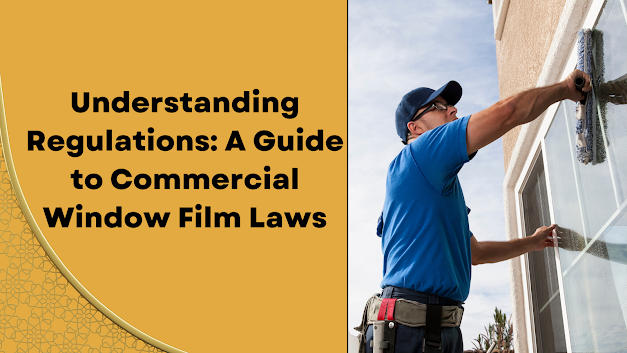Understanding Regulations: A Guide to Commercial Window Film Laws
If you own or manage a business with glazed areas like windows or glass doors, you need to be aware of the regulations around window films. Installing commercial window tints on your property can help with safety, security, energy efficiency, and aesthetics. However, there are specific legal guidelines you must follow regarding the type of tint that can be used. This blog post will provide an overview of commercial window tinting laws in the UK to help you make informed decisions.
Why Do Window Tinting Regulations Exist?
The main reason window film laws exist is to promote safety. Untinted glass can be a hazard if it shatters because the shards could harm people nearby. Bedroom window tint and other types of commercial window films help hold the glass together if it breaks to prevent injury. The tint also prevents glass from shattering into dangerous tiny fragments.
The government wants to make sure public places like retail stores, restaurants, offices, and other businesses use window films that meet safety standards. Specific laws indicate how much tint can be applied to various types of windows. Following these regulations ensures people are protected.
Overview of Legal Window Tint Percentages in the UK
The main law regarding commercial window tint in the UK is the Building Regulations Document N. This specifies how much light needs to pass through glazed areas in particular locations of a building. The regulations aim to provide sufficient visibility and safety near doors, partitions, balconies, passageways, and other areas the public uses.
Some key requirements for light transmittance under Document N include:
At least 80% light transmission for windows in doors and side panels
A minimum of 70% visibility for glass partitions, walls, or balconies under 1000 mm high
At least 50% of light passing through partitions, walls, or balconies over 1000 mm high
No less than 45% light transmission for glass in bathrooms or lavatories
Additional specifications exist for emergency exit doors, elevator enclosures, and other specialized windows. However, in most business settings, the general rule is that window films must allow a minimum of 50% visible light transmission.
More Details on Legal Window Tint UK Regulations
To fully comply with commercial window tinting laws in the UK, there are some other important factors to consider:
The stats above apply to clear or neutral-colored films. Darker tints, such as black or silver, are subject to stricter limits.
Special standards exist for locations like schools, hotels, transportation centers, and more based on their specific glass usage.
Any tint applied to the exterior of windows in new or refurbished buildings requires special permission.
The law requires businesses to maintain window films properly once they are installed. Damage, bubbling, peeling, or uneven fading can indicate that they need replacement.
DIY tinting is not recommended. Installers should be experts in meeting safety standards and receiving warranty benefits.
Legal window tint UK regulations can be complex, but the goal is protecting people. Consulting qualified window film installers is the best way for companies to determine which products meet the rules.
Why Businesses Should Use Legal Window Films
Beyond legal compliance, commercial window tinting done properly gives businesses important advantages:
Safety: Films that adhere to regulations not only comply with codes but also serve as a protective barrier, holding glass together when shattered to prevent injury.
Security: Tints act as a deterrent to break-ins, safeguarding inventory by obscuring visibility into the vehicle, thereby thwarting potential criminals.
Energy Efficiency: By effectively blocking heat from sunlight, window films reduce the workload on HVAC systems, leading to significant cost savings over time.
Glare Reduction: With tinting, interior lighting remains consistent by limiting the intrusion of bright sun rays, ensuring a comfortable environment for both occupants and goods.
Fading Prevention: UV protection inherent in quality films preserves the integrity of merchandise displays, furniture, artworks, and interiors, prolonging their lifespan and maintaining their aesthetic appeal.
Aesthetics: Whether opting for colored or frosted films, businesses have the opportunity to reinforce their brand image through customized tinting solutions that enhance the overall appearance of their premises.
For companies with glazed areas, adhering to window tinting regulations isn't merely a legal obligation—it's a commitment to the safety, security, and well-being of their customers and employees. Moreover, installers equipped with comprehensive knowledge can offer tailored recommendations that not only meet regulatory standards but also elevate the aesthetic and functional aspects of the premises, providing an additional layer of value.
FAQS
1. What are the main legal requirements for commercial window tinting in the UK?
The key regulations come from Building Regulations Document N. This specifies the minimum light transmission required through glazing in various areas to ensure visibility and prevent hazards. General rules are 80% light for door-side windows, 70% under 1000mm high partitions, and 50% above 1000mm.
2. Do window tinting laws apply to my home or vehicle?
No, legal light transmission percentages only apply to commercial and public buildings. Private homes and vehicle window tinting have different rules.
3. Can I be fined or penalized for non-compliant commercial window films?
Yes, penalties exist for disregarding legal tint limits on commercial properties. For serious breaches, fines, prohibition from opening your business, and even imprisonment are possible.
4. What should I do if my existing business windows don't meet light transmission minimums?
You can hire a professional window film company to assess your glazing and install products to raise it to legal visibility standards. This is often cheaper than full window replacement.
5. Will darker window films ever be allowed on commercial buildings?
Darker tints may be permitted in certain cases with special permission, like if a space has low foot traffic or another light source is added. However, in most public buildings, light films that meet the minimums will be required.
Conclusion
Understanding the regulations surrounding commercial window film can be simplified with expert assistance. Your brand, like many others, prioritizes adherence to standards to uphold the safety of both customers and employees. Additionally, adhering to legal guidelines for automotive window tinting not only results in cost savings but also enhances the aesthetic appeal of your spaces. Collaborating with seasoned professionals guarantees that any enhancements you make align with your specific requirements while remaining compliant with the regulations set forth in the UK.
Name: Tinting Express Limited
Address: Unit 17, Taw Mill Business Park, Howard Avenue, Barnstaple, Devon, UK
Phone No: 01271 320181




Comments
Post a Comment